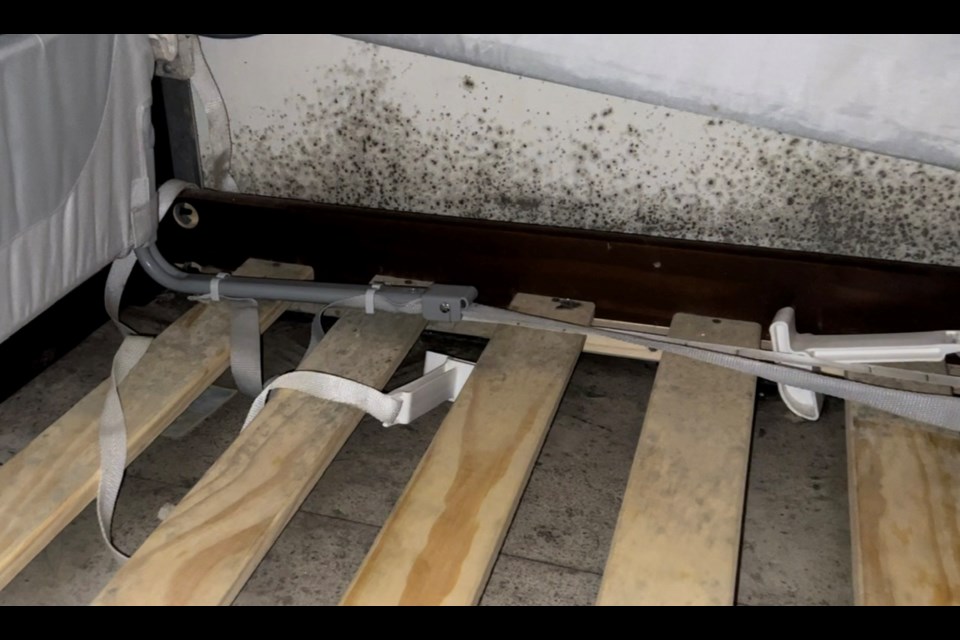For more than a month, Erin Birdsell has been sleeping on a loveseat at her parent’s home while her three young children share the bed – her mother resting on a pull-out couch and her father on a blow-up air mattress.
This is an effort to avoid exposure to the “significant mould problem” in her two-bedroom, Guelph Non-Profit Housing Corporation (GNPHC) unit.
She’s been asking for weeks to be moved to a mould-free unit, so far without success.
Others building tenants say they've been raising concerns too.
“I would be the stupidest parent in the world to bring my kids back here,” Birdsell said, sitting at a table in her Imperial Road, below-grade apartment unit where she lives with her two sons, ages three and five, along with her 18-month-old daughter and their English mastiff. “My kids have young, developing lungs.
“This is a major health problem.”
The family has lived in the unit for nearly six years, Birdsell said, explaining she discovered mould along the base of the outside wall in the children’s bedroom on April 15. More was later discovered in her bedroom as well as the living room.
“There was black, slimy mould. You could see the black, circular spore pattern of them as you went down to the baseboard,” Birdsell said of what she discovered. “As you went down to the baseboard, the mould got darker.
“Then on the floor itself, it was a mould/sludge mix where you could actually see white growing stuff on top of the sludge.”
Despite efforts to eliminate it, the mould isn't gone.
Birdsell said she reported the discovery to a building official and was told to clean it up using disinfectant wipes, which she did. After spending the night in the unit, though not in the bedroom where mould was discovered, she says local health officials advised her not to stay there until the mould was removed.
It’s that advice which prompted her to essentially move into her parents’ nearby apartment. At the time, she had no idea the situation would go on for so long.
Victoria Toman, GNPHC’s housing services manager, said via email she’s unable to comment on individual situations due to confidentiality reasons, but provided general details about the agency’s response to maintenance or mould issues.
“When faced with a mould issue, the staff work with experts to assess, treat, repair and prevent further concerns. We also collaborate with our tenants for scheduling inspections and work to be completed, which requires tenant participation,” she wrote.
“If a tenant needs to temporarily vacate the unit or relocate permanently for work to be completed, we rely on the experts to help inform those decisions and communicate that information to the tenants who are impacted.”
In an undated report from Under 1 Roof, an emergency service provider enlisted by GNPHC and provided to GuelphToday by Birdsell, the company explains a HEPA (high-efficiency particulate air) air scrubber was put into the unit and various mould and mildew cleaners used.
“Unless there was a flood in the bedroom or other water issue that I am not aware of, my conclusion is the mildew is clearly caused by the occupant’s lifestyle,” says the report, which goes on to note a lack of air circulation and ability to clean the window and wall due to the amount of contents.
GNPHC subsequently removed some flooring and the bottom portion of drywall along the outside wall of the children’s bedroom.
Reports from both an insurance restoration company and an environmental and industrial consulting firm provided by Birdsell point to building deficiencies as the likely cause of high moisture levels.
Frustrated with the response from Guelph Non-Profit Housing, Birdsell brought in LEX Scientific Inc. to look at the situation, paying out of her own pocket for samples to be collected and analyzed.
Its assessment of the situation was done on April 26.
“Review of the site observations, collected physical data and analytical data indicates that there is a significant mould problem present within the unit,” states the LEX report, which Birdsell provided to GuelphToday. “It was noted that all the areas of heavy mould growth were on exterior walls of the unit. Thermal imaging indicated several very cold spots at the base of the walls, which could be an indicator of moisture.
“Extremely high moisture readings identified in the son’s room could be indicative of a significant flooding event or ongoing water ingress or significant condensation problems.”
In it’s report, LEX recommends an “invasive investigation” of exterior walls and along the floor-wall connection in the children’s bedroom to “explore potential external causes for the elevated moisture, and mould growth in the room” as well as in the living room where it found “acutely elevated levels of airborne mould.”
An inspection report from Paul Davis insurance restoration company notes the “possible causes” include foundation cracks in the wall and floor and window leakage, along with moisture “possibly entering through footing.”
Mould is a relatively new issue in the unit, Birdsell said, pointing to the replacement of windows in about 2020 as the likely source of moisture mould needs to take hold.
In addition, the LEX report notes the appearance of cracks in the parging – a coating applied to the above ground portion of building foundations – below both the children’s bedroom window and a small living room window by a downspout.
“Low level water ingress from small cracks can result in chronic moisture loading on the building interior,” it states.
Birdsell said she’s noticed what she thought was “just dirt” near the windows since then, but now believes it’s been mould all along.
Jade Sippel, who is one of Birdsell's neighbours in the building, said she's been experiencing mould issues since she moved in about four years ago with her now-six-year-old son.
"It's just very frustrating," she said, noting she has to regularly "bleach the walls" to knock the mould back. "Almost every unit has this issue."
